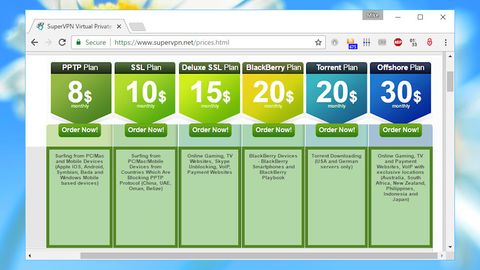TechRadar Verdict
A restrictive, low-end VPN which costs double what it’s worth (at least) in our opinion. Avoid.
Pros
- +
25+ locations in 20+ countries
- +
‘No logging’ promise
Cons
- -
No P2P support
- -
Inconsistent performance
- -
Only 128-bit encryption
- -
Expensive for what you get
Why you can trust TechRadar
Editor's note: Because of privacy and security concerns, we have pulled down the link associated with SuperVPN. Here are the best VPN services
Most VPN companies like ExpressVPN and NordVPN keep their product range to an absolute bare minimum: one or two plans, maybe a couple of payment options, all very easy to compare and understand.
US-based SuperVPN is more about choice and offers six products in total, from the $8 per month (around £6.50, AU$11) PPTP Plan to the $30 per month (around £25, AU$40) ‘Offshore’ plan.
The base plan we're reviewing has unlimited bandwidth and speed, but doesn't allow torrents, doesn't support simultaneous connections, limits server switching, and only offers 128-bit encryption.
The $10 per month (around £8, AU$13.50) SSL plan extends the product with full 4096-bit encryption via OpenVPN, adds a few servers, and supports unlimited switching.
The $20 per month (around £16, AU$27) Torrent plan is the only one to allow torrents via its US and German servers, and has support for five simultaneous connections.
It's a seriously expensive range, but we decided to sign up for the baseline PPTP Plan to find out what it had to offer.
Privacy
Heading off to SuperVPN's legal pages won't bury you in small-print. The company's terms of service are under 700 words, maybe 20% of the length of some of the competition, which earns a thumbs up from us.
The content is mixed. There's a clear ‘we do not log any user activity’ statement, but the company does log access attempts to the servers, session durations and bandwidth used, and for some reason these are kept for five days.
The company states that it will hand over information if ordered by a court with the appropriate jurisdiction. SuperVPN is US-based so that's more likely to happen than with some other services, but otherwise it's a very standard clause.
The rest of the items are equally familiar, and if you ever look at these contracts you'll recognise them immediately: ‘don't do illegal stuff’, ‘the service isn't guaranteed to work 100% of the time’, ‘we're not liable if there are problems’.
One issue we noticed was the strict refund policy. While this covers you for the first 15 days, it only applies if "there are significant problems with your VPN package and you are still not able to connect even with the help of our highly professional customer support". If you can connect but still have problems, or just want a refund for some other reason, you're likely to be out of luck.
Performance
Signing up for SuperVPN was disappointing. The website said PayPal was accepted, and there was even a PayPal logo on the payment page, but it wasn't available as an option. We had to use a credit card instead, while also providing much more personal data than usual, including our physical address and phone number.
15 minutes after payment an activation email arrived with our VPN username, password, server names, and as SuperVPN has no clients of its own, links to tutorials explaining how to set these up. This isn't difficult, but can be a little tedious, especially if you're intending to use many server locations (they must all be configured individually).
In our tests*, SuperVPN's best-case performance over short server hops wasn't great, with download speeds falling by a third compared to what we’d normally get. US-UK download speeds were just about acceptable on average at around 10Mbps, but varied hugely between tests, which could become annoying.
As there was no client to take care of DNS issues, our connection also leaked DNS requests, and visiting IPLeak.net displayed the address of our ISP DNS. Most people wouldn't check this, and it can't directly identify our precise identity, but this is a strong indicator to any observer that we're using a VPN.
Final verdict
This VPN is restrictive, there’s no PayPal, plus it’s plagued by inconsistent speeds and is too expensive for what you get. If there's a reason to choose Smart VPN rather than rival services, we struggled to find it.
- We’ve rounded up the best free VPN services

Mike is a lead security reviewer at Future, where he stress-tests VPNs, antivirus and more to find out which services are sure to keep you safe, and which are best avoided. Mike began his career as a lead software developer in the engineering world, where his creations were used by big-name companies from Rolls Royce to British Nuclear Fuels and British Aerospace. The early PC viruses caught Mike's attention, and he developed an interest in analyzing malware, and learning the low-level technical details of how Windows and network security work under the hood.

I'm off to France this summer, and this app could make me très fluent

Intel unveils flurry of new Arc GPUs — however serious graphics users will have to wait for more powerful models, as these focus on a completely different and more lucrative market

We just got another hint that the Samsung Galaxy Watch 7 is almost here
